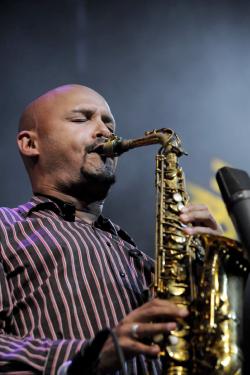Publication: New York Daily News
By: Greg Thomas
Date: Saturday, October 22, 2011
“The Mountaintop,” in a 16-week Broadway run at the Bernard B. Jacobs Theatre, has gotten attention for the star power of the lead actors — Samuel L. Jackson and Angela Bassett — and for the portrayal of a more human, less iconic side of Martin Luther King Jr.’s personality.
According to the play’s composer, the saxophonist, bandleader and record label founder Branford Marsalis, that’s the way it should be.
“Here’s a good metaphor,” he proposes. “We had a talk with some students from the Brooklyn High School for the Arts after one of the previews. And Samuel Jackson came onstage, Angela Bassett came on, and the playwright Katori Hall came on. The kids didn’t ask me anything. That’s the apt metaphor because the music serves the purpose of accentuation or complement.
“Weak music can’t really kill a play. Weak acting can destroy a play, regardless of how good the music is,” Marsalis says.
“For instance, take Prokofiev’s score to the ballet based on Shakespeare’s ‘Romeo and Juliet.’ It’s a fantastic piece of music, and a great ballet. If you put the ballet out there and they’re tripping all over themselves and dancing like crap, nobody’s going to say, ‘That ballet really sucked, but the music was really good.’ They’re going to say, ‘That ballet sucked — period.’ “
In his first Broadway role, Jackson acts the part of Dr. King after he gave the famous “I’ve Been to the Mountaintop” speech. Jackson was a student at Morehouse College, King’s alma mater, at the time. He served as an usher at King’s funeral and flew to Memphis right after to march with the black sanitation workers on whose behalf King was fighting for a livable wage.
Bassett is a mysterious chambermaid named Camae. She gives a powerful soliloquy at the close of the play that Marsalis uses to give a momentary feel of a musical, in which the music and narration occur simultaneously. The show conjures video images of a future King never would see.
Marsalis based the ensemble music — bass, drums and saxophone — on Bassett’s cadence.
“The music starts off slow and picks up speed, and gets quicker and quicker, and her cadence gets faster and faster, and the images come faster and faster,” he says. “It’s a good effect.”
Cadence, which in Western music refers to characteristic rhythmic patterns, is an important concept that Marsalis uses to explain the difference between Hall’s approach as a playwright and August Wilson’s. The late Wilson is notable for his cycle of plays that dramatize black American life in the 20th century.
Read more »

